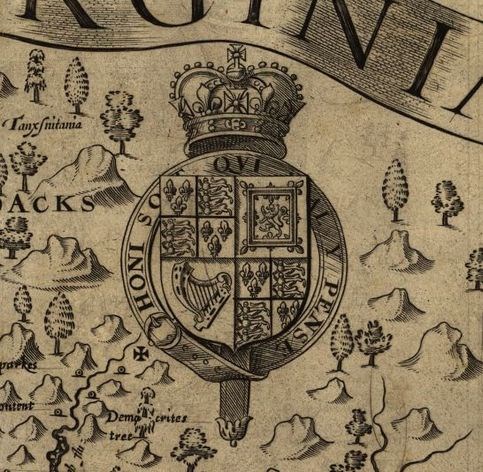Last updated: February 4, 2022
Article
Colonialism: John Smith in Context

NPS
During this period, several European nations sought to increase their wealth and power by taking control of trade routes and areas rich in natural resources. The seizure of land and establishment of colonies took place in Asia, Africa, and Australia, as well as the Americas, knowledge of which first became widespread in Europe after Christopher Columbus’ 1492 voyage.
Captain John Smith's 1608 voyages took place within this colonial context. The primary purpose of his exploration of the Chesapeake was to seek information that would aid in the establishment of English colonies in the Americas. The United States of America, the colonial story tells us, is not the story of one people or one nation. It is an international and intercultural story. In this story, we see human nature at its best and also at its very worst.
There are a few basic facts about the world before 1500 that can help us understand how the following centuries of colonialism came about.
-
The Americas were home to thousands of societies ranging in organization from “bands” to tributary networks to large, urbanized empires such as the Maya, Inca, and Aztec. Therefore, there was also a diversity of economic models. Connecting these diverse societies were trade routes, evidenced by the presence of Central American food crops like corn in the Chesapeake Bay, for example.
-
Urbanized societies in Africa date back to ancient Nubia and Kemet (Egypt). Prior to the 1400s, wealthy African empires traded gold and other commodities throughout the continent and abroad to places like India and China. In the 1400s, the Portuguese began trading with West African kingdoms, such as the Islamic Mali empire. Trade goods, knowledge, and culture were exchanged between the continents of Europe and Africa.
-
In addition to Africa'sTrans-Saharan trade route, the other major global trade network was the “Silk Road” connecting Asia, the Middle East, and Europe. The Ottoman Empire (modern-day Turkey) benefited greatly from its geographical location along this trade route, serving as the center of trade between Asia and Europe. Nearby Italy, too, grew powerful as a middleman connecting the rest of Europe to Anatolia and Asia.
But something came along that disrupted this world order. At the turn of the 16th century, a major opportunity was presented to western European nations looking to improve their positions:
-
The discovery of two sea routes previously unknown to Europeans: (1) a passage to the Indian Ocean around Africa’s southern coast and (2) passage to the Americas accross the Atlantic Ocean.
-
Improvement in European shipbuilding and navigational technologies made long sea voyages possible.
With the ability to sail into new territory, western European nations saw a way to cut out the middleman and go directly to the source of trade goods. Portugal sailed into the Indian Ocean, establishing trading posts on islands as they went. There, spices were a valuable commodity. While exploring islands in the Atlantic, the Portuguese reached South America in what is now Brazil. Spain, meanwhile, reached the Caribbean islands and by 1600 had conquered the Aztec and Inca empires.Gold was the most valuable of the numerous resources the Spanish were able to seize from their new colonies. Seeking their own fortunes, other western European countries, including France, England, and the Netherlands, began exploring regions of North America that had not yet been reached by the Spanish or Portuguese.
As with any major historical event, there was much debate in European societies about the morality of colonization, in particular the treatment of Indigenous peoples. The debate over using military force to conquer foreign peoples took place largely within the religious frameworks of Catholicism and Protestantism.
For example, while some argued that colonization was justified because it brought “civilization” and Christianity to Indigenous peoples, others argued that paganism alone was not a justification for the seizure of property.
Here are some voices from the early colonial period:
“Now the ultimate end and scope that incited the Spaniards to endeavor the [Extirpation] and Desolation of this People, was Gold only; that thereby growing opulent in a short time, they might arrive at once at such Degrees and Dignities, as were no [means] consistent with their Persons.”
Bartolomé de Las Casas, A Brief Account of the Destruction of the Indies, 1542
“This plaine History humbly [shows] the truth; that our most royall King [J]ames hath place and opportunitie to [e]nlarge his ancient Dominions without wronging any…the Prince his Highness may see where to plant new Colonies. The gaining [Provinces] addeth to the Kings Crown: but the reducing Heathen people to [civility] and true Religion, bringeth honour to the King of [Heaven].”
John Smith, The Generall Historie of Virginia, New-England, and the Summer Isles, 1624
-
Genocide of Indigenous Peoples - The number of Indigenous peoples in the Americas killed by European diseases and invasion is difficult to estimate. However, scientists have found that the number was so high that it impacted the world’s climate.
-
Shift in Global Power - European nations became dominant world powers. The English built the largest empire in history, a domination that did not face a serious challenge until the United States of America declared independence in 1776. Other nations did the same over the following two centuries.
-
Slavery and Transatlantic Slave Trade – Slavery has been practiced throughout human history in many civilizations. However, prior to the modern period of European colonialism, enslavement was not usually associated with any particular nationality or ethnicity. Enslaved individuals might be White or Black, European or African, Christian or Muslim. However, in the colonial period, the transatlantic slave trade between Africa and the Americas emerged as European powers relied on forced labor to derive profit from their colonies.
